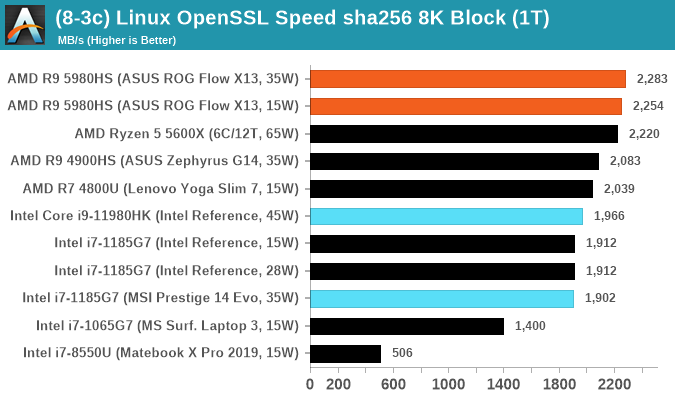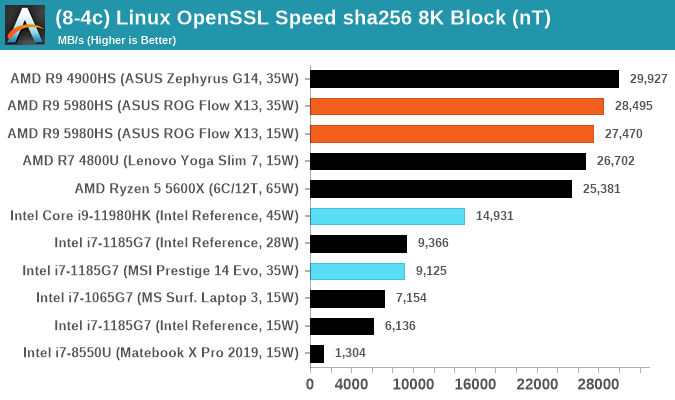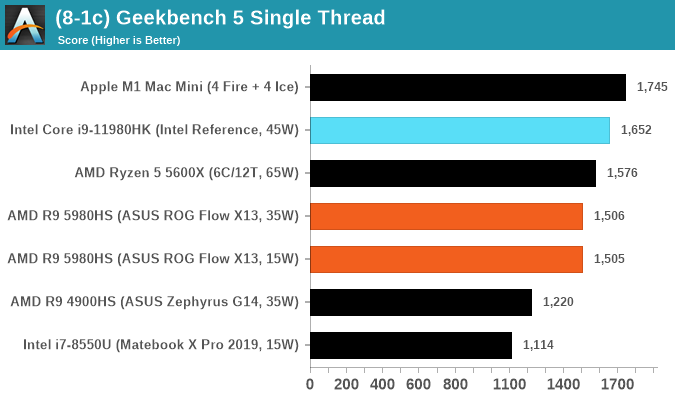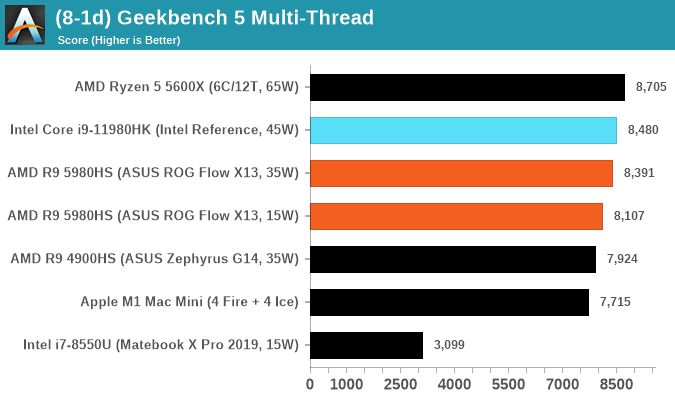Intel 11th Generation Core Tiger Lake-H Performance Review: Fast and Power Hungry
by Brett Howse & Andrei Frumusanu on May 17, 2021 9:00 AM EST- Posted in
- CPUs
- Intel
- 10nm
- Willow Cove
- SuperFin
- 11th Gen
- Tiger Lake-H
CPU Tests: Synthetic
Most of the people in our industry have a love/hate relationship when it comes to synthetic tests. On the one hand, they’re often good for quick summaries of performance and are easy to use, but most of the time the tests aren’t related to any real software. Synthetic tests are often very good at burrowing down to a specific set of instructions and maximizing the performance out of those. Due to requests from a number of our readers, we have the following synthetic tests.
Linux OpenSSL Speed: SHA256
One of our readers reached out in early 2020 and stated that he was interested in looking at OpenSSL hashing rates in Linux. Luckily OpenSSL in Linux has a function called ‘speed’ that allows the user to determine how fast the system is for any given hashing algorithm, as well as signing and verifying messages.
OpenSSL offers a lot of algorithms to choose from, and based on a quick Twitter poll, we narrowed it down to the following:
- rsa2048 sign and rsa2048 verify
- sha256 at 8K block size
- md5 at 8K block size
For each of these tests, we run them in single thread and multithreaded mode. All the graphs are in our benchmark database, Bench, and we use the sha256 results in published reviews.


GeekBench 5: Link
As a common tool for cross-platform testing between mobile, PC, and Mac, GeekBench is an ultimate exercise in synthetic testing across a range of algorithms looking for peak throughput. Tests include encryption, compression, fast Fourier transform, memory operations, n-body physics, matrix operations, histogram manipulation, and HTML parsing.
Unfortunately we are not going to include the Intel GB5 results in this review, although you can find them inside our benchmark database. The reason behind this is down to AVX512 acceleration of GB5's AES test - this causes a substantial performance difference in single threaded workloads that thus sub-test completely skews any of Intel's results to the point of literal absurdity. AES is not that important of a real-world workload, so the fact that it obscures the rest of GB5's subtests makes overall score comparisons to Intel CPUs with AVX512 installed irrelevant to draw any conclusions. This is also important for future comparisons of Intel CPUs, such as Rocket Lake, which will have AVX512 installed. Users should ask to see the sub-test scores, or a version of GB5 where the AES test is removed.


To clarify the point on AES. The Core i9-10900K scores 1878 in the AES test, while 1185G7 scores 4149. While we're not necessarily against the use of accelerators especially given that the future is going to be based on how many and how efficient these accelerators work (we can argue whether AVX-512 is efficient compared to dedicated silicon), the issue stems from a combi-test like GeekBench in which it condenses several different (around 20) tests into a single number from which conclusions are meant to be drawn. If one test gets accelerated enough to skew the end result, then rather than being a representation of a set of tests, that one single test becomes the conclusion at the behest of the others, and it's at that point the test should be removed and put on its own. GeekBench 4 had memory tests that were removed for Geekbench 5 for similar reasons, and should there be a sixth GeekBench iteraction, our recommendation is that the cryptography is removed for similar reasons. There are 100s of cryptography algorithms to optimize for, but in the event where a popular tests focuses on a single algorithm, that then becomes an optimization target and becomes meaningless when the broader ecosystem overwhelmingly uses other cryptography algorithms.










229 Comments
View All Comments
back2future - Tuesday, May 18, 2021 - link
it's almost one could skip PCIe4 if early 2022 PCIe5 is stable on power management and performance expectations on mainboards?mode_13h - Thursday, May 20, 2021 - link
> it's almost one could skip PCIe4 if early 2022 PCIe5 is stable ... on mainboards?Uh, I'm still eager to see exactly how Intel is going to use PCIe 5, in Alder Lake. I suspect it'll be used only for the DMI link to the chipset, in fact.
Since graphics cards and M.2 SSDs aren't even close to maxing PCIe 4, I struggle to see why they would bother with the added cost and potential issues of supporting 5.
heickelrrx - Monday, May 17, 2021 - link
you can put 4x link on Video card and get 8x speed on Gen 3mean they can put more stuff, with less link, not faster stuff
mode_13h - Tuesday, May 18, 2021 - link
> you can put 4x link on Video card and get 8x speed on Gen 3In terms of power-efficiency, I'd bet the wider, slower link is better.
> mean they can put more stuff, with less link, not faster stuff
It's a laptop. So, prolly not gonna run out of PCIe lanes.
gagegfg - Monday, May 17, 2021 - link
"and if anticipated, great gaming performance"...Inside this notebook case he had a hard time controlling the temperature, if you add a 100W GPU, where is the rest for this cpu?
mmm .... it's going to be interesting.
Matthias B V - Monday, May 17, 2021 - link
Most OEMs still prefer Intel as it has capacity that AMD can't offer and even more it has better features and integration such as AV1 coding, USB / TB 4.0, Intel WIFI etc.Also Intels provides better support for OEMs in design and issues.
Gigaplex - Monday, May 17, 2021 - link
AMD systems can provide TB support, there's no technical limitation preventing it. Intel WiFi chips are standalone cards, which also work fine in AMD systems (my AMD board has Intel WiFi). There's no reason to use an Intel CPU for either of those features.Retycint - Monday, May 17, 2021 - link
The fact that not a single AMD laptop has thunderbolt, points to an issue with cost of implementation/PCI lanes limitations etc. which apparently doesn't exist on Intel CPUs, given how many Intel laptops come with TB as default. This is a fact, and talking about what's possible theoretically doesn't change the facts that AMD systems lack TBCityBlue - Monday, May 17, 2021 - link
> The fact that not a single AMD laptop has thunderbolt, points to an issue with cost of implementation/PCI lanes limitations etc.Perhaps. Or it's simply a reflection of the fact that there is only niche demand for TB.
It's on Intel based laptops because it's supported by the chipset so pretty much a no-brainer (or alternatively, Intel mandates it is included, in order to try and make it more relevant?)
However the vast majority of laptop consumers don't need, want or care about TB, so the extra cost to include it in AMD laptops doesn't appear justified. I'm sure a vendor could include TB on an AMD laptop if they ever thought they'd get a reasonable return on the extra cost.
And maybe now that Intel have been kicked in to touch by Apple, Intel might lose interest in TB in future.
TB has its fans, but it also has the distinct whiff of being the next FireWire.
RobJoy - Tuesday, May 18, 2021 - link
The fact that TB still exists, baffles me.We all should move on.